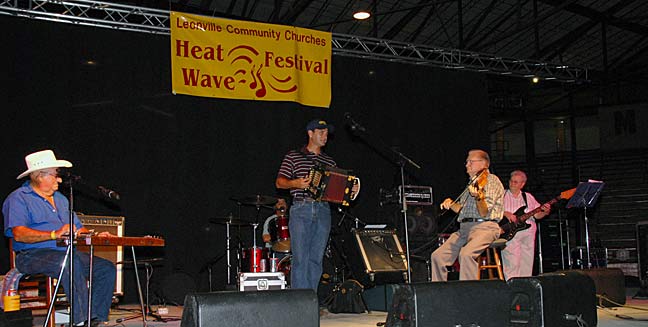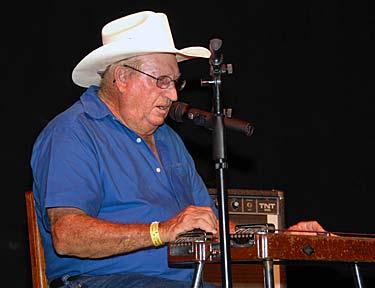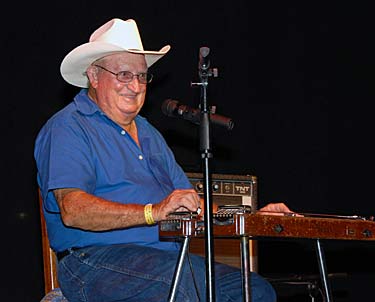|
Archive Files of Cajun, Creole, and Zydeco Musicians |
The Touchet Family |
 In 2002, Eva Touchet received the Cajun French Music Association's "Le Cajun" award as Female Vocalist of the Year.
|
The phrase “Original Authentic Cajun Music” aptly appears on Swallow Records releases, never more aptly than on The Best Recordings of The Touchet Family and Friends. The music of the Touchet family dates back at least as early as 1940 when three Touchet brothers began playing at house dances in Vermilion Parish. According to the liner notes with the CD, their mother, Celestine Touchet, played the accordion at the house dances, and at least half of the twelve children in the family learned to play musical instruments. Eventually four of the brothers established a band that performed at area clubs, and, in 1947, their sister Eva also became a member of the group. They stopped performing when their mother died. After playing with another group for more than a decade, Acronge “Tee Coon” Touchet revived the Touchet Brothers Band, which also included a variety of other well known musicians over the years. The liner notes provide additional interesting details. The CD includes eleven songs that were released on a 1985 Swallow album (with recordings from the late sixties forward) and four tracks from 1995. Six tracks from late 2000 were released for the first time on the CD, which came out in 2001. A number of the original songs by the Touchets have become Cajun standards. The photos on this page were taken in July 2006 when Arconge Touchet on steel guitar and Eva Touchet on bass were singing “Jolie Fille,” a song that has become a signature for Sheryl and Russell Cormier. The Mamou Playboys included “The Life I Thought I Wanted” on their Bon Rêve CD. In “Old Fashioned Two-Step,” Willis Touchet asks us to forget about the old times (especially parental involvement in courtship). While the Touchets certainly don’t forget about the past, their songs do not offer nostalgia. In “Bananas and Oranges for Christmas,” written by Willis Touchet and KLFY’s Bob Moore, the children feel left out when all their parents can afford to give them for Christmas is some fruit. “Imagine the Cajuns” describes an earlier life that consisted of hard work in the fields, family tragedy, and persecution for speaking French. Many of the other songs are waltzes about loss and loneliness: “Poor Man Waltz,” “Separation Waltz,” “I’ll Always Be Waiting,” “I’ll Walk Alone,” “Lost Her in the Pines” (the Cajun version of an Appalachian folk song), “Lonesome Cajun Waltz,” “It’s Lonesome in Prison” “I Don’t Care If Tomorrow Never Comes,” “Life of a Widow,” “Night Life,” “Dream Just of Me.” A few songs are happier. In “God Understands,” a mother reassures her daughter that God understands her prayers in French for a pair of shoes, which she agrees to buy. Other two-steps include “La Belle Musique” and the instrumentals “Touchet Brothers Special” and “Ossun Two-Step.” The music of the Touchets is Cajun music, but it is also family music. This is not a show band trying to make their way up the charts. They play for one another and for their friends and neighbors, and the music is genuine without affectation. Those family relationships, the connections that run through immediate and extended families, have had an essential role in both Cajun and Creole music. Stage bands certainly have their place and have helped the music gain wider audiences, but it is also a pleasure to hear the family tradition in the Touchets’ “original authentic Cajun music.” |

Donny Brossard is on accordion playing with Arconge "Tee Coon" Touchet on steel guitar, Willis Touchet on fiddle, and Eva Touchet on bass at the Heat Wave Festival in Lafayette at Blackham Coliseum in July 2006.
Posted 8-16-06.
All photographs and text by David Simpson.


